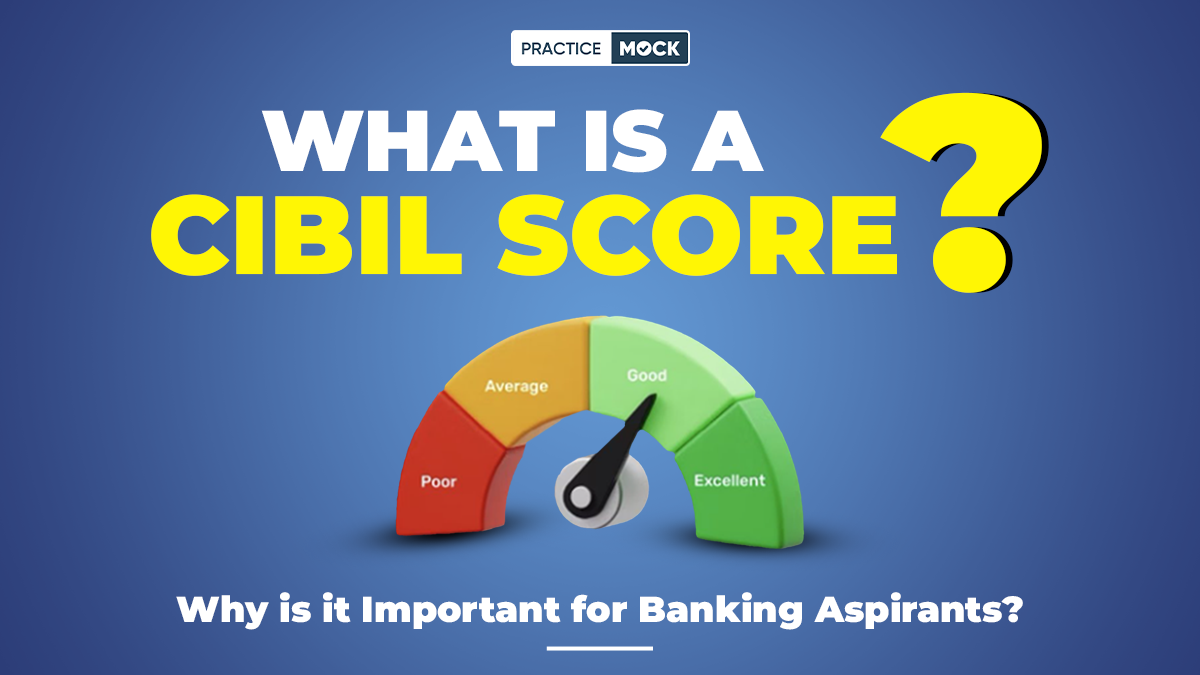Banking exam aspirants often hear the terms CIBIL Score and Credit Score. The credit score is calculated based on the years of credit history of an individual. The credit score is a part of the financial awareness section in banking exams such as IBPS, SBI, RBI, NABARD, etc. Therefore, the candidates preparing for these exams need to know the CIBIL Score and Credit Score and their importance in banking. Continue reading to get complete information about the CIBIL Score and its importance for banking aspirants.
About CIBIL Score
The CIBIL score is taken into account while applying for loans. The CIBIL is an organisation named Credit Information Bureau (India) Limited that calculates credit scores of individuals. A CIBIL Score, also known as a credit score, is a 3-digit number ranging from 300 to 900 that represents a person’s creditworthiness. The CIBIL score of an individual is issued by TransUnion CIBIL. It is one of India’s leading credit information companies. The closer the CIBIL score is to 900, the higher the chances are of a person getting their credit card or loan application approved.
What is the difference between CIBIL Score and Credit Score?
The credit score and the CIBIL score are two different terms. The credit score can be calculated by any authorized organization, but the CIBIL Score is calculated by CIBIL only.
- Credit Score is a general term.
- CIBIL Score is the specific credit score provided by TransUnion CIBIL.
- Other credit bureaus like Experian, Equifax, and CRIF High Mark also offer credit scores.
How is CIBIL Score Calculated?
The CIBIL score is derived from the credit history found in the CIBIL Report. It takes into account the borrower’s credit profile over the last 36 months. The credit profile includes all kinds of loans such as home loans, personal loans, automobile loans, overdraft facilities, etc. that one has availed and their payment history.
Is CIBIL Score important for Bank Exams?
As mentioned earlier, the CIBIL score is not required when you apply for the bank exams. And you can appear for the bank exams without knowing your CIBIL Score. But maintaining a good CIBIL Score has an overall impact on your personal finances and loan processing tasks. When you apply for the Loan Officer roles then your CIBIL Score may be required by the bank during the appointment. However, maintaining a CIBIL Score range of 700+ is a good practice if you are a banking exam aspirant.
How to Check Your CIBIL Score?
You can check your score online through:
- Visit the CIBIL official website. (cibil.com)
- Other credit bureaus like Experian, Equifax, and CRIF High Mark also provide scores.
- Usually, one free report per year is available.
CIBIL Score Range and It’s Meaning
The range of a CIBIL Score is between 300 to 900. The higher the range, the better the individual’s account performance. Below is the table stating the CIBIL Score range and its meaning.
| Score Range | Meaning |
|---|---|
| 750 – 900 | Excellent – High creditworthiness |
| 700 – 749 | Good – Likely to get credit approved |
| 650 – 699 | Fair – May get credit with higher interest |
| 600 – 649 | Poor – Credit approval difficult |
| Below 600 | Very Poor – High risk for lenders |
| NA/NH | No credit history |
What is the minimum CIBIL Score for Bank Exams?
There is no official minimum CIBIL score required to appear for bank exams like IBPS PO, IBPS Clerk, SBI PO, RBI Grade B, etc. Your CIBIL score has no impact on your eligibility to apply for or write banking exams. Some public and private sector banks may check your CIBIL score during document verification or background checks, especially for roles such as:
- Loan officer or credit analyst roles.
- Sensitive roles involving financial data or cash handling.
A very low score might raise concerns. But, it usually won’t disqualify you unless there is a serious financial misconduct. Private banks (like HDFC, ICICI, Axis) and NBFCs often check CIBIL scores for hiring, particularly for customer-facing or credit-related roles. A score above 700 is generally preferred in such cases.
Even though it’s not mandatory for exams:
- Maintain a score of 700+ to avoid any hurdles during the job onboarding.
- Ensure no active loan defaults or unresolved credit issues.
Why is CIBIL Score important for Banking Aspirants?
The CIBIL Score is important for banking aspirants because questions from this topic are asked in the General Awareness section. And it is also important because knowledge about this is important for customer interaction, the CIBIL Score is checked at the time of appointment in the Loan Processing roles, and is also considered important for personal finance.
- General Awareness: Credit scores are part of financial knowledge expected in exams like IBPS, SBI, RBI, NABARD, etc.
- Customer Interaction: As future bankers, aspirants must explain credit scores to customers.
- Loan Processing Roles: Knowledge of CIBIL scores is essential while approving or rejecting credit applications.
- Personal Finance: Maintaining a good score is vital even for aspirants seeking education loans or future credit needs.

Summary
A CIBIL Score is a three-digit number given to you by an organization named Credit Information Bureau Limited (CIBIL). It is calculated based on the person’s last 36 months’ credit history. It represents the trustworthiness of an Individual while they apply for loans. If the person has a good CIBIL score, that means the person has either not taken any loans or has repaid the loans on time. Maintaining a good CIBIL Score (Above 700) is considered a good practice for individuals looking for a profession in banking.
Banking Exams Free Mock Test
| IBPS RRB PO Free Mock Test | IBPS PO Free Mock Test |
| SBI PO Free Mock Test | IBPS SO Free Mock Test |
| IBPS RRB Clerk Free Mock Test | IBPS Clerk Free Mock Test |
Join our exclusive Telegram group, where our experts are ready to answer all your queries, guide you in banking exam preparation, and give personalised tips to boost your success. Get access to real-time solutions, expert advice, and valuable resources to improve your study journey.

FAQs
A CIBIL score is calculated by the Credit Information Bureau of India Limited based on the last 36 months’ credit history report of an individual’s bank account.
A person has a good CIBIL score if their CIBIL score ranges above 700.
No, the CIBIL Score and Credit score are not the same. The credit score is calculated by any organisation. While a CIBIL Score is calculated by Credit Information Bureau of India Limited.
The CIBIL Score is part of the General Awareness Section in the Bank exams. You can apply for bank exams without knowing your credit score. But in some private banks, a good CIBIL score is required during the appointment.
- Sign Up on Practicemock for Updated Current Affairs, Topic Tests and Mini Mocks
- Sign Up Here to Download Free Study Material
Free Mock Tests for the Upcoming Exams
- IBPS PO Free Mock Test
- RBI Grade B Free Mock Test
- IBPS SO Free Mock Test
- NABARD Grade A Free Mock Test
- SSC CGL Free Mock Test
- IBPS Clerk Free Mock Test
- IBPS RRB PO Free Mock Test
- IBPS RRB Clerk Free Mock Test
- RRB NTPC Free Mock Test
- SSC MTS Free Mock Test
- SSC Strenographer Free Mock Test
- GATE Mechanical Free Mock Test
- GATE Civil Free Mock Test
- RRB ALP Free Mock Test
- SSC CPO Free Mock Test
- AFCAT Free Mock Test
- SEBI Grade A Free Mock Test
- IFSCA Grade A Free Mock Test
- RRB JE Free Mock Test
- Free Banking Live Test
- Free SSC Live Test



